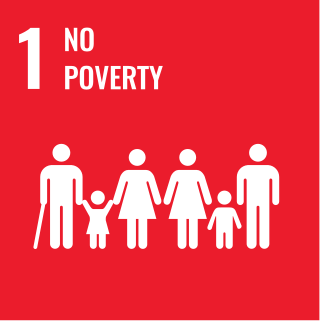
The United Nations Economic and Social Council (ECOSOC) is one of the six principal organs of the United Nations, responsible for coordinating the economic and social fields of the organization, specifically in regards to the fifteen specialized agencies, the eight functional commissions, and the five regional commissions under its jurisdiction.

Disability is the experience of any condition that makes it more difficult for a person to do certain activities or have equitable access within a given society. Disabilities may be cognitive, developmental, intellectual, mental, physical, sensory, or a combination of multiple factors. Disabilities can be present from birth or can be acquired during a person's lifetime. Historically, disabilities have only been recognized based on a narrow set of criteria—however, disabilities are not binary and can be present in unique characteristics depending on the individual. A disability may be readily visible, or invisible in nature.

The United Nations System consists of the United Nations' six principal bodies, the Specialized Agencies and related organizations. The UN System includes subsidiary bodies such as the separately administered funds and programmes, research and training institutes, and other subsidiary entities. Some of these organizations predate the founding of the United Nations in 1945 and were inherited after the dissolution of the League of Nations.
The United Nations General Assembly, in December 2003, proclaimed the years 2005-2015 as the International Decade for Action 'Water for Life'. Its primary goal is to promote efforts to fulfill international commitments made on water and water related issues. In the United Nations Millennium Development Goals (MDGs) by 2015. In March 2019, the United Nations General Assembly declared the years 2018-2028 as the Water Action Decade.
The Vienna Declaration and Programme of Action (VDPA) is a human rights declaration adopted by consensus at the World Conference on Human Rights on 25 June 1993 in Vienna, Austria. The position of United Nations High Commissioner for Human Rights was recommended by this Declaration and subsequently created by General Assembly Resolution 48/141.

The United Nations Permanent Forum on Indigenous Issues is the UN's central coordinating body for matters relating to the concerns and rights of the world's indigenous peoples. There are more than 370 million indigenous people in some 70 countries worldwide.

International Day of Persons with Disabilities is an international observance promoted by the United Nations since 1992. It has been observed with varying degrees of success around the planet. The observance of the Day aims to promote an understanding of disability issues and mobilize support for the dignity, rights and well-being of persons with disabilities. It also seeks to increase awareness of gains to be derived from the integration of persons with disabilities in every aspect of political, social, economic and cultural life. It was originally called "International Day of Disabled Persons" until 2007. Each year the day focuses on a different issue.
Disabled Peoples' International (DPI) is a cross disability, consumer controlled international non-governmental organization (INGO) headquartered in Ottawa, Ontario, Canada, and with regional offices in Asia-Pacific, the Middle East, Europe, Africa, Latin America, and North America and the Caribbean. DPI is a network of national organizations or assemblies of disabled people, established in 1980–81 to promote the human rights of disabled people through full participation, equalization of opportunity and development. DPI assists organisations in over 152 nations with the day to day issues of helping disabled people. They also host assemblies and symposiums across the world with their different national branches.
The following outline is provided as an overview of and topical guide to the United Nations:

The Philippines' National Council on Disability Affairs (NCDA) is the national government agency mandated to formulate policies and coordinate the activities of all agencies, whether public or private, concerning disability issues and concerns. As such, the NCWDP is the lead agency tasked to steer the course of program development for persons with disabilities and the delivery of services to the sector.

The Convention on the Rights of Persons with Disabilities is an international human rights treaty of the United Nations intended to protect the rights and dignity of persons with disabilities. Parties to the convention are required to promote, protect, and ensure the full enjoyment of human rights by persons with disabilities and ensure that persons with disabilities enjoy full equality under the law. The Convention serves as a major catalyst in the global disability rights movement enabling a shift from viewing persons with disabilities as objects of charity, medical treatment and social protection towards viewing them as full and equal members of society, with human rights. The convention was the first U.N. human rights treaty of the twenty-first century.

Alan Anderson Reich was the founder of the National Organization on Disability. In 1962 Reich sustained severe spinal injuries in a diving accident, making him a wheelchair user for the rest of his life. Afterwards, Reich returned to Polaroid where he served as an executive in manufacturing management and corporate long-range planning until 1970, when he became the U.S. Deputy Assistant Secretary of State for Educational and Cultural Affairs. In 1982 he founded the National Organization on Disability.
The world's poor are significantly more likely to have or incur a disability within their lifetime compared to more financially privileged populations. The rate of disability within impoverished nations is notably higher than that found in more developed countries. Since the early 2010s there has been growing research in support of an association between disability and poverty and of a cycle by which poverty and disability are mutually reinforcing. Physical, cognitive, mental, emotional, sensory, or developmental impairments independently or in tandem with one another may increase one's likelihood of becoming impoverished, while living in poverty may increase one's potential of having or acquiring disability in some capacity.
South Africans with disabilities constitute a sizeable proportion of the population, and their status in society is extremely varied in a developing nation with socio-economic inequality and a history of apartheid. Wealthy city dwellers have access to a wide range of assistance, whereas the poor struggle for even the basic necessities of life.
Estimates vary for the number of people with disabilities in Nigeria, ranging from under 3 million people to over 25 million. Nigerian law prohibits discrimination against people with disabilities.
Reliable information about disability in North Korea, like other information about social conditions in the country, is difficult to find. As of 2016, North Korea is a signatory to the United Nations Convention on the Rights of Persons with Disabilities.
Bengt Olof Lennart Lindqvist was a Swedish politician and advocate of persons with disabilities.

In the Philippines, disability is one of the social issues affecting a portion of the Philippines' population. To ensure the equality and rights of disabled persons, there are Philippine laws and policies that were passed regarding persons with disabilities (PWDs). There are also numerous non-government associations that seeks to encourage and help improve the wellbeing of people with disabilities.

Sustainable Development Goal 1, one of the 17 Sustainable Development Goals established by the United Nations in 2015, calls for the end of poverty in all forms. The official wording is: "No Poverty". Member countries have pledged to "Leave No One Behind": underlying the goal is a "powerful commitment to leave no one behind and to reach those farthest behind first".

The United Nations Framework Convention on Climate Change (UNFCCC), the Paris Agreement, the Sustainable Development Goals (SDGs), and the United Nations Convention on the Rights of Persons with Disabilities (CRPD) are connected through their common goals of addressing global challenges and promoting sustainable development through policies and international cooperation.








